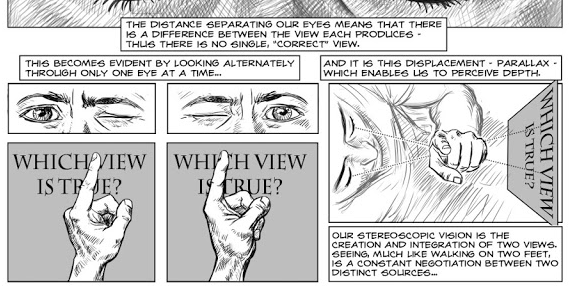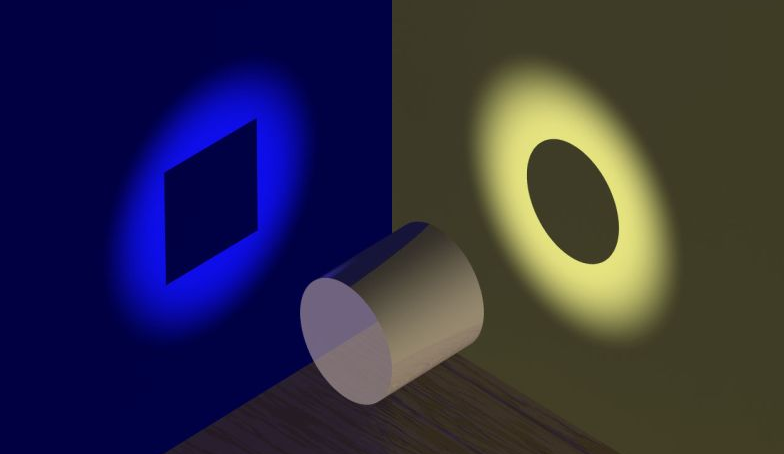If you& #39;re still using an epistemology (rationalist or otherwise) where if two statements or perspectives contradict each other then one must be false, then today& #39;s your lucky day to learn about resolving paradoxes using higher-dimensional thinking! https://twitter.com/Malcolm_Ocean/status/1131779888179032064">https://twitter.com/Malcolm_O...
Your two eyes have different perspectives and thus contradict each other constantly about what& #39;s closer and what& #39;s on what side of what...
...and—usually—rather than wasting energy on an argument over which 2D view is right, the brain integrates them into DEPTH PERCEPTION https://abs.twimg.com/emoji/v2/... draggable="false" alt="🤯" title="Exploding head" aria-label="Emoji: Exploding head">
https://abs.twimg.com/emoji/v2/... draggable="false" alt="🤯" title="Exploding head" aria-label="Emoji: Exploding head">
...and—usually—rather than wasting energy on an argument over which 2D view is right, the brain integrates them into DEPTH PERCEPTION
Similarly, when two people each have a different perspective on something, they can waste energy arguing over which limited 1-person perspective is right, OR they can seek to integrate their perspectives into something deeper & richer.
This isn& #39;t just "oh, you have this part, I have that part, discard the falsehoods & keep the true parts".
If I think this object looks like a square and you think it looks like a circle, then neither of us is mistaken about what we& #39;re seeing. We& #39;re just missing the larger whole.
If I think this object looks like a square and you think it looks like a circle, then neither of us is mistaken about what we& #39;re seeing. We& #39;re just missing the larger whole.
That example (the image at least) comes from this great article by Daniel Schmactenberger. https://civilizationemerging.com/higher-dimensional-thinking-the-end-of-paradox-and-a-more-adequate-understanding-of-reality/">https://civilizationemerging.com/higher-di...
A longer and more evocative depiction of the same thing is in @Nsousanis& #39;s book Unflattening. I& #39;ve shared the main 2 relevant pages below, though they& #39;re richer in the context of the whole book. https://twitter.com/Malcolm_Ocean/status/1201904762419056642">https://twitter.com/Malcolm_O...
I& #39;m not thoroughly certain of this, but it seems possible to me that just like a single eye can& #39;t see in 3D, there may be thoughts that are too complex for a single person to hold at once, so it& #39;s not just about answering some question then distributing the answer to each person.
@Morphenius this thread collects most of what I& #39;ve tweeted about parallax

 Read on Twitter
Read on Twitter " title="Your two eyes have different perspectives and thus contradict each other constantly about what& #39;s closer and what& #39;s on what side of what......and—usually—rather than wasting energy on an argument over which 2D view is right, the brain integrates them into DEPTH PERCEPTION https://abs.twimg.com/emoji/v2/... draggable="false" alt="🤯" title="Exploding head" aria-label="Emoji: Exploding head">" class="img-responsive" style="max-width:100%;"/>
" title="Your two eyes have different perspectives and thus contradict each other constantly about what& #39;s closer and what& #39;s on what side of what......and—usually—rather than wasting energy on an argument over which 2D view is right, the brain integrates them into DEPTH PERCEPTION https://abs.twimg.com/emoji/v2/... draggable="false" alt="🤯" title="Exploding head" aria-label="Emoji: Exploding head">" class="img-responsive" style="max-width:100%;"/>



